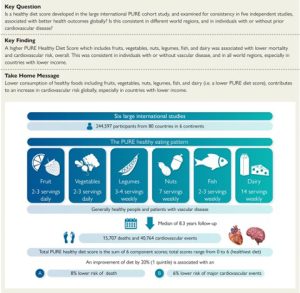Great research study from McMaster University, worth knowing about: Diet, cardiovascular disease, and mortality in 80 countries (2023)

You can open this image (from the article highlighted at this page): Structured Graphical Abstract
I’ve been reading a large-scale study which concludes that for long-term cardiovascular health the following daily food intake is the way to go:
two to three servings of fruit daily
two to three servings of vegetables daily
three to four servings of legumes weekly
seven weekly servings of nuts
two to three servings of fish weekly, and
14 weekly servings of dairy; does not need to be low-fat dairy (butter and whipping cream not included in the count)
Source: Diet, cardiovascular disease, and mortality in 80 countries
Andrew Mente, Mahshid Dehghan, Sumathy Rangarajan, Martin O’Donnell, Weihong Hu, Gilles Dagenais, Andreas Wielgosz, Scott A. Lear, Li Wei, Rafael Diaz, Alvaro Avezum, Patricio Lopez-Jaramillo, Fernando Lanas, Sumathi Swaminathan, Manmeet Kaur, K Vijayakumar, Viswanathan Mohan, Rajeev Gupta, Andrzej Szuba, Romaina Iqbal, Rita Yusuf, Noushin Mohammadifard, Rasha Khatib, Nafiza Mat Nasir, Kubilay Karsidag, Annika Rosengren, Afzalhussein Yusufali, Edelweiss Wentzel-Viljoen, Jephat Chifamba, Antonio Dans, Khalid F Alhabib, Karen Yeates, Koon Teo, Hertzel C Gerstein, Salim Yusuf
European Heart Journal, Volume 44, Issue 28, 21 July 2023, Pages 2560–2579, https://doi.org/10.1093/eurheartj/ehad269
Published: 06 July 2023
The research is from McMaster University, Hamilton, Ontario
The above-noted research study is connected with McMaster University; a relevant link is this one:
Eating these six healthy foods is linked to lower risk of cardiovascular disease and death
The amazing thing about this research is that it is not widely reported. I am pleased I came across it through a tweet from McMaster University on the web platform formerly known as Twitter. I was active on Twitter for over a decade and built up a vast supply of useful articles, sources, and information. These stand me in good stead even now when I am no longer nearly as active on what used to be called Twitter.
It’s noteworthy that the new research says it’s fine to eat plenty of full-fat dairy products (with the exception of butter and whipping cream). Previous research had prompted the food industry to market low-fat dairy products on the basis of what at that time were touted as the health benefits of restriction of fats in dairy products.
I feel comfortable in following the food guidelines in this research study. I do not feel comfortable at all in strictly following government-authorized food guidelines from Canada or the United States. My lack of comfort is based on my reading of articles over the years regarding the political influences which come into play when such guidelines are devised, revised, updated, and published.
For my purposes as a consumer, I want to know what the evidence is claimed t0 be – and how the evidence has been verified and corroborated over time. There is nothing complicated about this. It’s a matter of being data oriented, and having an interest in good, reliable reporting.
I’ve been following research in this area for a long time
A related post from 2015 is entitled:
Ancel Keys’s study was highly flawed and ignored contradictory research, according to Nina Teicholz
A post from 2016 is entitled:
Sugar is the scourge, not fat, according to several, converging lines of evidence
A post from 2017 is entitled:

Leave a Reply
Want to join the discussion?Feel free to contribute!